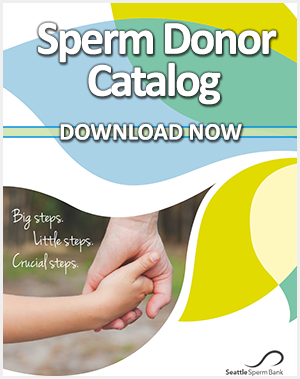Using a sperm donor to have a child is an effective and affordable option for many women and couples. But it’s important to recognize that this process may bring up complex emotional issues for you and your partner. These issues can range from disappointment over not being able to conceive on your own to concerns about what to tell friends and family.
Perhaps the biggest concern is how and when – or whether – to tell your child when he or she begins asking questions about their origins. These are all reasonable and normal concerns worthy of serious consideration. After all, this is a major life decision. It’s also a highly personal one.
The best time to talk about these feelings is before starting the insemination process. We strongly advise our clients to discuss any issues with their partners, a professional counselor, or other trusted advisor. This blog post is designed to help you start that important conversation.
Examining your feelings about donor conception
If you have a spouse or partner, the best first step is to honestly discuss your feelings and concerns about using a sperm donor. Possible questions to ask include:
- Are you both completely comfortable with the decision?
- If you are heterosexual, are you in denial or grieving the fact that you can’t conceive together biologically? If one of you is infertile, have you fully discussed how that makes you feel? Is it a source of tension between you?
- How comfortable are you discussing your choice of conception with friends and family?
- If you’re male, are you comfortable and willing to raise a child that you aren’t genetically related to?
Once you answer these, there is one more critical question to ask: Do we tell the child?
Explaining to your child that they were donor conceived
There are two common reasons people tell their child the truth about their conception. The first concerns the importance of open and honest communication between parents and children. Secrets can strain family relationships and cause serious harm if the child accidentally finds out later in life. And as is often the case with secrets, it’s rare for them to stay secret forever. That’s why so many counselors and child psychologists advise parents to tell children as early in life as possible in order to avoid feelings of betrayal or confusion when they are older and asking normal questions about their background.
The second most commonly cited reason in support of disclosure is the child’s right to know their biological origins. This may be for health reasons, such as wanting to know about genetic dispositions to certain diseases, or simply to satisfy the human desire to know where we came from.
How to explain the choice you made
You can explain that your child’s donor (often a better word choice than father or dad, which can be confusing in this context) was selected with great care. You may mention that they picked a donor with special traits – intelligence, sensitivity, talent, a great sense of humor, etc. – and that that is exactly what you got in your child! This may help you explain to your child why you picked the particular donor you did.
All children have their own unique characteristics of course. So it’s important to remember that regardless of donor choice, the main influence on the child’s life will be you, your spouse or partner, and the larger network of family and friend surrounding you. Nature certainly matters, but so does nurture. The child may have some of the personality traits of the donor, but ultimately you will be the greatest influence on their growth and development. And in that way, there’s no wrong choice of donor. They will be your child. No matter how the child was conceived, they must know that they are wanted and loved.
The benefits of open identity donors
Whether or not to tell your child about their origins is a personal question that must be addressed by each parent. However, for those who are certain they will disclose this fact to their child in the future, an open identity donor is a better option than the anonymous donor route.
An open identity donor refers to a donor who has contractually agreed to at least one form of contact with any donation-born offspring once the child turns 18. This makes it easier for prospective children to contact their donors at the appropriate time should they wish to do so. And only the child can initiate the contact, not the donor. Seattle Sperm Bank specializes in working with open identity donors, and we are happy to answer any questions you have.



